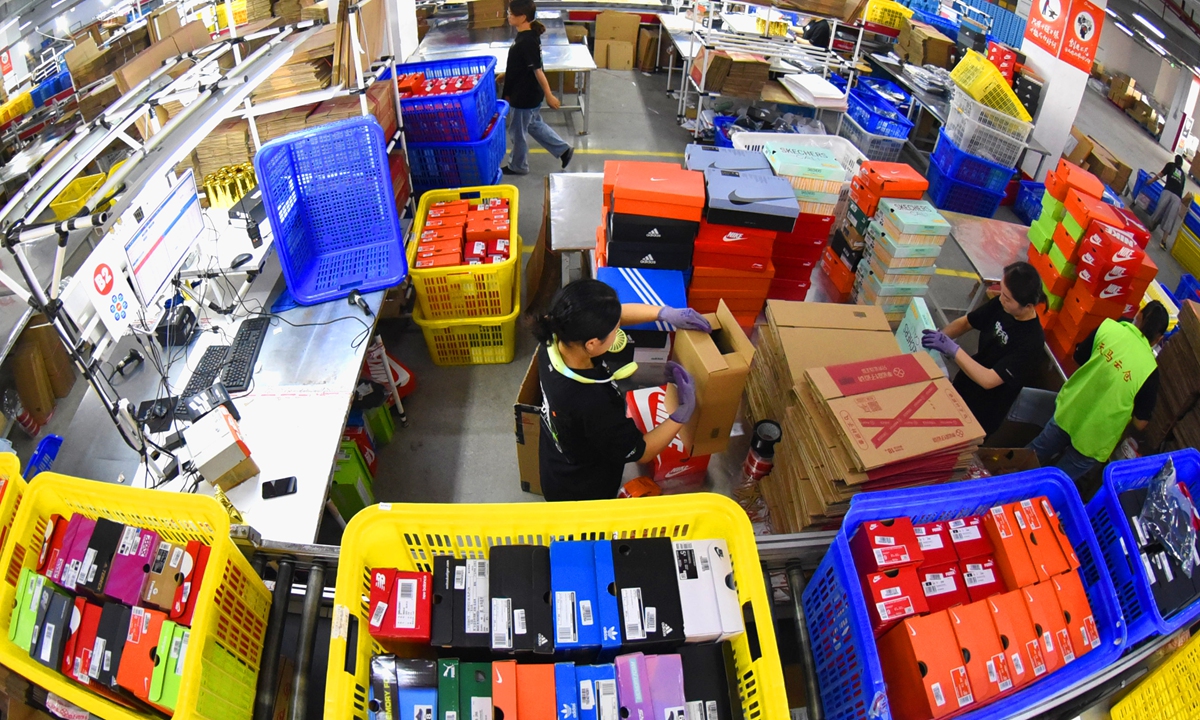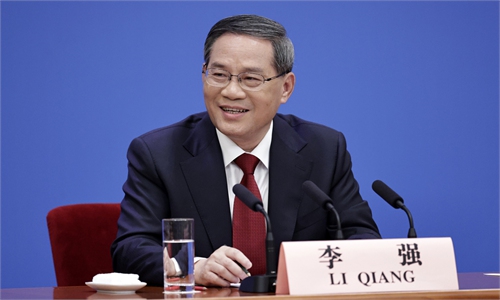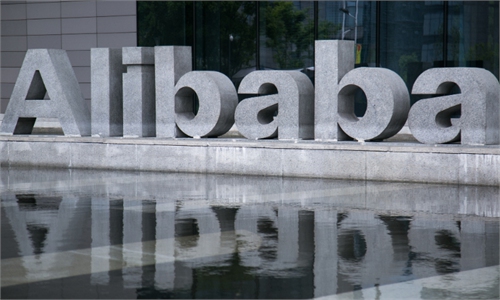Chinese internet shares jump on shot in the arm for healthy development of platform economy
Platform operators set to play larger role in economic upgrade

Staff at an industry zone in Lianyungang, East China's Jiangsu Province sort packages on Friday, the day China's major e-commerce platforms including JD and Alibaba's Tmall celebrate this year 618 mid-year shopping festival. Photo: VCG
Chinese internet stocks jumped on Thursday after Premier Li Qiang presided over a meeting with major domestic platform operators, as the central government's encouraging tone serves as a shot in the arm for the healthy development of the platform economy.Analysts and industry insiders said that positive signs indicate that the rectification of major problems in platform companies has been completed and the regulatory system has gradually improved. Now, Chinese internet firms are expected to play a larger role in the country's economic upgrade and the intensified high-tech competition between China and the US.
Government agencies' recent communications with private enterprises underscored the special importance the central government attaches to the private sector, and served as an earnest implementation of policies that support the private economy's development, analysts said.
On the Hong Kong market, Chinese leading food delivery platform Meituan closed up 5.73 percent to HK$134.6 ($17.49) on Thursday, video sharing website Bilibili up 7.52 percent to HK$133 and Tencent up 2.88 percent to HK$349.8.
The Guotai CSI Hong Kong Connect Technology ETF, which includes companies including Tencent, Xiaomi and Kuaishou, inched up 3.09 percent on Thursday to reach 0.801.
The upbeat performance came after a symposium on the platform economy, during which Li said that the sector has boosted demand, provided an engine for innovation and development, created new channels for employment and entrepreneurship, and offered support for public services, the Xinhua News Agency reported.
He encouraged platform enterprises to stay confident and look ahead to leading in development, creating jobs and participating in international competition.
On the same day, the National Development and Reform Commission endorsed projects by 10 internet giants, including Alibaba, Tencent and Meituan.
"These moves send a strong signal that the intense regulation and rectification of the platform economy has ended, and the development of major platform enterprises has entered a new stage of regulated development," Ma Jihua, founder of Beijing DARUI Management Consulting Co, told the Global Times on Thursday.
Dong Shaopeng, a senior research fellow at the Chongyang Institute for Financial Studies at the Renmin University of China, said the last round of rectification has improved Chinese internet firms' corporate governance and resolved risks in a timely way, unleashing great potential for innovation.
The well-regulated, healthy and sustainable development of platform economy in China conforms to the needs of the era, as the country's economic transformation and upgrading will be driven by advanced technologies, while some high-tech sectors like cloud computing have become a new battleground in the US tech "decoupling" from China, Ma said.
"As the world enters the Internet of Things era, the development of the real economy is closely linked with the internet. With wide coverage, platform companies play an important role in driving up domestic investment, employment and consumption," a senior private equity investor who focuses on tech investments told the Global Times.
He said the medium- and long-term prospects of the internet sector are bright and vast, with new opportunities emerging in every segment along the industry chain, for example, artificial intelligence (AI), cloud computing, the Internet of Things, blockchain and digital currencies.
Along with the rollout of OpenAI Inc's ChatGPT, leading Chinese internet firms are striving to upgrade their own AI language models.
Chinese voice-recognition company iFlytek said it aims to exceed ChatGPT's capabilities in the Chinese language while reaching the same level as the chatbot in English in the fourth quarter of the year.
According to a report released by Zhidongxi, an AI-focused research firm in China, 51 generative AI start-ups around the world raised about 100 billion yuan ($13.96 billion) in the first half of 2023, with 22 Chinese firms receiving funding.
"The Chinese government always supports the development of platform firms and encourages them to lead development, create more jobs and fully display their capabilities in international competition," Dong said.
Recently, government agencies held meetings with private firms in order to establish and improve regular communication mechanisms, which are the fresh air of the new government, he said.
At a critical point of economic transformation and against the backdrop of major changes in the global political and economic environment, there is much to do to improve China's business environment and thus more such communications are likely, according to Dong.



